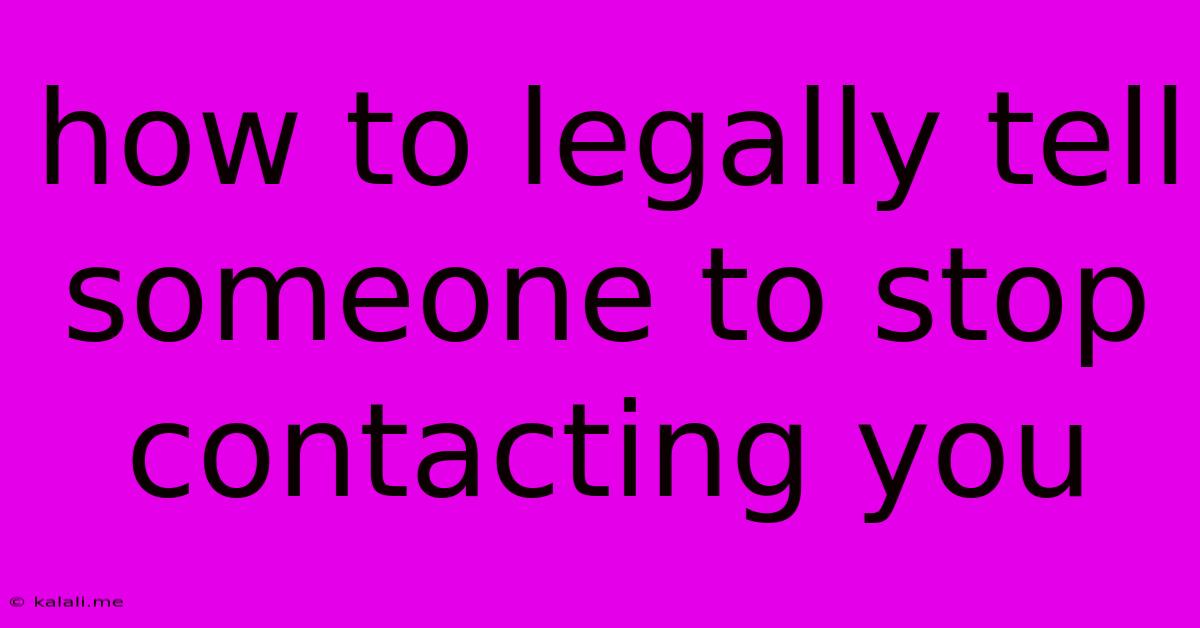How To Legally Tell Someone To Stop Contacting You
Kalali
Jun 08, 2025 · 3 min read

Table of Contents
How to Legally Tell Someone to Stop Contacting You
Are you dealing with unwanted contact from someone? Feeling harassed, stalked, or simply overwhelmed by persistent communication? This article will guide you through the legal steps you can take to stop unwanted contact, covering everything from informal requests to obtaining legal protection. Knowing your rights and options is crucial for regaining control and protecting your well-being.
Understanding Your Options: From Gentle Requests to Legal Action
The best approach depends on your relationship with the individual and the severity of the unwanted contact. We'll explore several methods, ranging from informal strategies to formal legal processes.
1. Direct and Clear Communication: The First Step
Before escalating to legal action, a firm and unambiguous communication is essential. This can be done via:
- A Written Letter (Certified Mail with Return Receipt Requested): This provides documented proof of your request. Clearly state that you want all contact to cease, and outline the consequences if contact continues. Be specific about what constitutes unwanted contact (phone calls, emails, texts, visits, etc.).
- Email (Keep a Copy): Similar to a letter, a well-written email can serve as evidence. Again, be clear, concise, and assertive.
- Text Message (Keep a Copy): While less formal, a text message can be used if that’s the primary method of contact.
Important Note: Maintain a record of all communications – including the date, time, method, and content. This documentation is crucial if you need to pursue further legal action.
2. Cease and Desist Letter: A More Formal Approach
If direct communication fails, a cease and desist letter from you or your attorney is a more formal and forceful option. This letter legally demands the cessation of all contact. It usually outlines:
- Specific examples of unwanted contact.
- A clear demand for the contact to stop immediately.
- The potential legal consequences if contact continues.
A cease and desist letter should be drafted by a legal professional to ensure it’s legally sound and effective.
3. Legal Protection Orders: When Informal Methods Fail
If the unwanted contact persists despite your attempts at direct communication or a cease and desist letter, you may need to seek legal protection. This could involve applying for:
- Restraining Order (or Protection Order): This court order legally prohibits the individual from contacting you, coming near your home or workplace, or engaging in other specified behaviors. You'll need to demonstrate to the court that you're in fear of your safety or well-being. The specific requirements for obtaining a restraining order vary by jurisdiction.
- Civil Harassment Restraining Order: This is specifically designed to address harassment and stalking behaviors.
Obtaining a legal protection order requires providing evidence of the unwanted contact. This evidence might include:
- Written communications (letters, emails, texts).
- Witness statements.
- Police reports.
4. Criminal Charges: In Cases of Serious Harm or Threat
In severe cases involving threats, violence, or stalking, you should immediately contact the police. This might lead to criminal charges against the individual.
Protecting Yourself Online:
Unwanted online contact requires a different approach:
- Block the individual on all social media platforms and messaging apps.
- Report harassment or abuse to the platform.
- Consider changing your email address and phone number.
Seeking Professional Help:
Dealing with unwanted contact can be emotionally draining. Don’t hesitate to seek help from:
- A lawyer specializing in family law or civil litigation.
- A therapist or counselor.
- Support groups for victims of harassment or stalking.
Remember, you are not alone. Taking decisive action to protect yourself is crucial. By understanding your legal options and using the appropriate channels, you can effectively put a stop to unwanted contact and reclaim your peace of mind. This information is for educational purposes only, and it is advisable to consult with a legal professional for advice tailored to your specific situation.
Latest Posts
Latest Posts
-
Why Is Washington Dc So Democratic
Jun 08, 2025
-
Is Ground Pork The Same As Ground Sausage
Jun 08, 2025
-
Creatures Of The Chosen Types Get Plus One
Jun 08, 2025
-
Across Astride Or Side To Side
Jun 08, 2025
-
Taylor Series Ln 1 X 2
Jun 08, 2025
Related Post
Thank you for visiting our website which covers about How To Legally Tell Someone To Stop Contacting You . We hope the information provided has been useful to you. Feel free to contact us if you have any questions or need further assistance. See you next time and don't miss to bookmark.